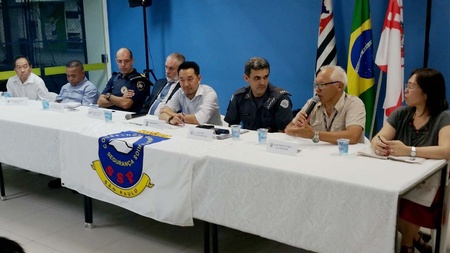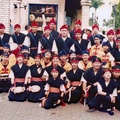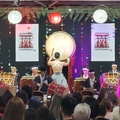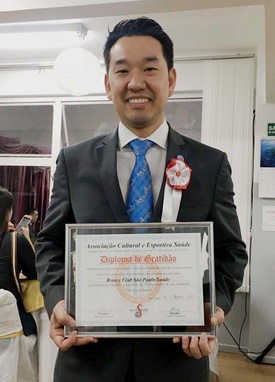
Ronaldo Yuzo Ogasawara, 39, is a real estate businessman, sansei and part of his roots are in the province of Hokkaido, in the far north of Japan.
Since the age of four, he has lived in the Jardim da Saúde neighborhood, in São Paulo, where he works alongside residents and people of Japanese descent as president of the Health Security Council-Vila Clementino and Rotary Saúde.
He also participates in other Japanese-Brazilian entities, such as Bunkyo – Brazilian Society of Japanese Culture and Social Assistance.
This community life began – and has already become busy – just a few years ago.
Coexistence at school and college
Ronaldo studied until the second year of high school at a school where the number of descendants was low. “There was discrimination due to cultural” and physical differences. Sometimes, he would take the typical Japanese lunch box “ and for them [his classmates] it was very strange that you would take a bento and want to eat it with chopsticks . It wasn’t a snack, it was a meal.”
In the last year of high school he changed schools and, in the class, 50% were descendants. “There was no prejudice, especially because there were many descendants, so non-descendants who attended school did not see this physical and cultural difference. On the contrary, sometimes they even absorbed some of our habits”, he says.
Already in college, during both the Accounting and Law courses, it was natural to interact with other Nikkei .
The image that immigrants left to subsequent generations
Ogasawara says that there is a “prejudice in favor” of Japanese descendants in Brazil, because Japan emerged as an economic power and because immigrants made a difference – they fought, prospered and provided a more dignified life for subsequent generations. And, despite having been discriminated against, Brazilian Nikkei have “this side that characterizes commitment, honesty, hard work”.
The family story is that the grandmother had no way out, there was no way back, “so the only option was to invest in studying and work hard”. Because the pioneers realized that the only way out was to invest in their children, in the training they didn't have. Many of them, the first and even the second child, did not have access and the rest of the children had this opportunity. “These are the values she passed on to her children, right?”
Involvement with the Nikkei community
In the first school where Ronaldo studied, there were three or four Nikkei in the class. One of them used to go to clubs – at Clube Ipê – where the vast majority were descendants and invited him. “I went to find out, I didn’t know this universe existed.” At that time, he was 14 years old and it was from then on that he began to “hang out with the colony”.
Then, around five years ago, the first place he started going was Kaikan , where he studied Japanese – now he can read and write. Furthermore, I only went to food festivals.
Interest and curiosity arose early. “Since I was little, I always liked talking to older people, so it was a very natural thing to want to know information. To this day I still talk to my grandmother [aged 96], even in front of my children so they can hear this information”, he reveals.
“She tells me facts about what happened so I can understand the thoughts of these immigrants a little more. So I can extract some information on the spot about what they went through.”
Effective participation
Nine years ago, almost ten, Ogasawara began participating in the Health Security Council-Vila Clementino as a resident, to expose security problems in the neighborhood. “I even had a problem with my family being robbed twice in the same day. So this caused me a feeling of helplessness and revolt. Afterwards, I ended up participating more actively in this Council and then I tried to find out what ways I could help improve or look for solutions”.
Until about three and a half, four years ago, the president already had some physical weakness and they considered making him president, because he has lived in the neighborhood since childhood and knows many residents. “I was a little worried, because until then I only focused on my professional activity and my family. But I decided to accept this challenge”, he confesses.
“And I think that was the start of being able to pursue new challenges in relation to the community. So I tried to interact, check what solutions, how we could improve our conduct, so that it could have results, not just complain. And then little by little I was invited to other institutions, assuming these collective responsibilities, right?”
He then became a counselor at the Pioneiro Educational Center, because he helped voluntarily at all events.
Furthermore, ACE Saúde – Associação Cultural Esportiva Saúde, a non-profit institution, asked Ronaldo for help in forming the board of directors. “My participation in kaikan is so that all this cultural baggage is not lost and is transmitted to new generations in a dynamic way and that it is not something imposed, that it is something natural”. There, classes in judo, kendo, table tennis, Japanese, English, ikebana and even computer classes for the elderly are offered.
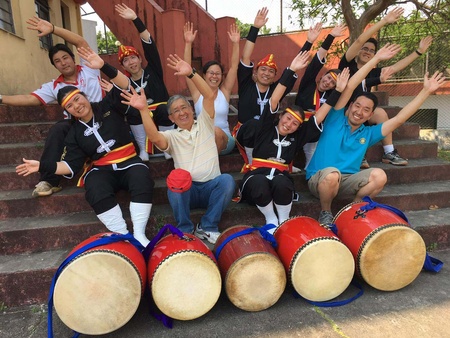
At Bunkyo, he was invited to join “a youth wing that is helping volunteers with their work”, but he became a Fiscal Councilor for reasons of time and physical logistics.
In a year and a half of participation in Rotary Health, it took him just one year to become president. “As president of Rotary, I imagined that – as I preside over the Security Council and Rotary has a premise that is 'giving of yourself before thinking about yourself' – I could build and integrate projects – new or already carried out – together with the Security Council. Because in my opinion, security is not simply about protecting ourselves, I think we have to get to the root of the problem”, he states. For Ronaldo, it is the “family institution”, because many times “families are unstructured”.
Still on Rotary and Bunkyo, comment on what you think is fundamental for these institutions. “For the survival of anything, be it a family, a business, or a social institution, everyone must have a very open mind to change.”
“My management was guided by changes. You need to participate in social networks, advertise your business. We have to sell what we are doing, if you want the institution to remain robust. But, on the other hand, we have to respect traditionalism and see what will be the healthiest way for you to introduce this ideal”, he says.
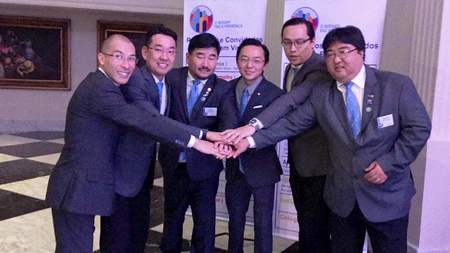
Japanese values
“Among my cousins, the only one who wanted to know the stories was me.” And with that, Ogasawara says that a feeling of gratitude arose and began to see the pioneers as victorious. Therefore, he tries to pass on the principles to his children so that they do not forget. “Despite the very adverse situation, we have to fight in the best way possible. This doesn't mean we're going to get rich. It’s about getting your space in society with integrity and doing your best.”
The three children – aged 13, 16 and 17 – studied Japanese, but have freedom to think and interact. “Because times are different, I think we have to respect each generation, we have to be very careful, because what is good for me is sometimes not good for them. So the principles, the values, I will transmit, because it is my responsibility as a father, who wants the best for his children”, he says.
“Japan is a country where the community is at the forefront of everything. And always when we are guided by the collective, whether in a company, in the social sphere, even in the family, it will work fully and satisfactorily”, he compares. To conclude, he leaves a reflection to be made: if Brazil uses the principle of collectivity as a basis, “it has a lot to advance”.
© 2018 Tatiana Maebuchi


